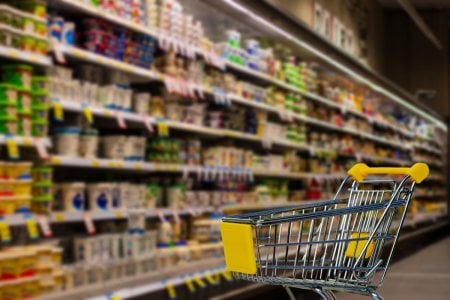Caught in the act: Supermarket worker shares heart-wrenching stories of desperate shoplifters
- Replies 24
Is it fair to call someone a criminal for stealing food, especially if they're doing it to survive?
According to an anonymous supermarket worker, the issue is far from black and white. In an opinion article for The Guardian, they shared how they have confronted shoplifters every day for five years.
There has been a rise in supermarket theft, not only in Australia, but all over the world. According to The Guardian, Australian supermarkets have reported a 20% increase in stock loss, which is attributed to both food wastage and theft. Compare this to data from the British Retail Consortium, the UK has seen a 26% rise in retail thefts in England and Wales. Some experts, like John Lewis chair Dame Sharon White, calls the crisis an 'epidemic’.
Michelle Whitehead, another supermarket employee, shared on BBC News that shoplifters often steal essentials like meat, milk, and baby food.
The anonymous supermarket worker and Whitehead both believe that the increase in shoplifting is due to the rising cost of living. Essentials are becoming too expensive, driving those in need to resort to shoplifting.
‘At the bottom of the shoplifting pyramid are those who are living in dire poverty and are ravenously hungry. Their focus is less on stealing high-value items and more on urgently filling their empty stomachs,’ the anonymous supermarket worker says.
They add, ‘I spent a period street-homeless several years ago, so I know what it feels like to be hungry and have no means of getting a meal. Sometimes when someone is caught stealing a low-value item such as bread and is clearly hungry, another shopper who witnesses them being caught offers to pay for the stolen item.’
What's surprising for them, however, is the wide range of individuals involved. ‘I’ve seen shoplifting by people from all walks of life’. Some are professionals, well-dressed to deceive, while others are simply trying to get by.
This lack of punishment, she reveals, is almost to be expected. ‘The police often don't even come when they are called.’ They stress, ‘I have never seen anyone prosecuted for shoplifting in all my time working in supermarkets. If we call the police they ask us if anyone has been stabbed. If the answer is no, they often don’t come, or come hours after the event…’
In their eyes, the issue goes beyond just legal matters. ‘There was one occasion where I chased a shoplifter who stole some sausages. He begged to be able to keep them so he could take them home and have something to eat. He handed them back but I regretted chasing him and decided I would never do it again. I could see how desperate he was.’
Following this experience, they argue, ‘Stealing can never be condoned,’ but then emphasise that the root cause often lies in a ‘threadbare safety net that is failing to catch the most vulnerable’.
As we already know, shoplifting rates are getting worse in Australia, prompting heightened store surveillance.
So, what's the way forward?
Experts suggest 'situational prevention'—making it harder to commit the crime in the first place. In fact, Coles has already started employing tactics like trolley locking systems, aiming to curb theft before it happens.
‘Like most businesses and public spaces, we use surveillance technologies in accordance with stringent privacy laws, and we have strict protocols in place around access to the footage,’ a Coles spokesperson says.
Woolworths, on the other hand, has been utilising Auror's retail crime intelligence platform since 2020. ‘All Woolworths supermarkets, Metro and Big W stores across the country use the Auror system as a means of reporting antisocial and unlawful incidents including theft, abuse to team members and violence,’ says a Woolworths spokesperson.
Simply put, it is clear that stricter policy measures alone won't fix the shoplifting issue in the UK or Australia. A broader solution addressing economic and social factors is needed.

So members, how else do you think we can prevent shoplifting? Do you agree that tackling the root causes like economic pressures and social inequality is the place to start? Share your thoughts in the comments below!
According to an anonymous supermarket worker, the issue is far from black and white. In an opinion article for The Guardian, they shared how they have confronted shoplifters every day for five years.
There has been a rise in supermarket theft, not only in Australia, but all over the world. According to The Guardian, Australian supermarkets have reported a 20% increase in stock loss, which is attributed to both food wastage and theft. Compare this to data from the British Retail Consortium, the UK has seen a 26% rise in retail thefts in England and Wales. Some experts, like John Lewis chair Dame Sharon White, calls the crisis an 'epidemic’.
Michelle Whitehead, another supermarket employee, shared on BBC News that shoplifters often steal essentials like meat, milk, and baby food.
The anonymous supermarket worker and Whitehead both believe that the increase in shoplifting is due to the rising cost of living. Essentials are becoming too expensive, driving those in need to resort to shoplifting.
‘At the bottom of the shoplifting pyramid are those who are living in dire poverty and are ravenously hungry. Their focus is less on stealing high-value items and more on urgently filling their empty stomachs,’ the anonymous supermarket worker says.
They add, ‘I spent a period street-homeless several years ago, so I know what it feels like to be hungry and have no means of getting a meal. Sometimes when someone is caught stealing a low-value item such as bread and is clearly hungry, another shopper who witnesses them being caught offers to pay for the stolen item.’
What's surprising for them, however, is the wide range of individuals involved. ‘I’ve seen shoplifting by people from all walks of life’. Some are professionals, well-dressed to deceive, while others are simply trying to get by.
This lack of punishment, she reveals, is almost to be expected. ‘The police often don't even come when they are called.’ They stress, ‘I have never seen anyone prosecuted for shoplifting in all my time working in supermarkets. If we call the police they ask us if anyone has been stabbed. If the answer is no, they often don’t come, or come hours after the event…’
In their eyes, the issue goes beyond just legal matters. ‘There was one occasion where I chased a shoplifter who stole some sausages. He begged to be able to keep them so he could take them home and have something to eat. He handed them back but I regretted chasing him and decided I would never do it again. I could see how desperate he was.’
Following this experience, they argue, ‘Stealing can never be condoned,’ but then emphasise that the root cause often lies in a ‘threadbare safety net that is failing to catch the most vulnerable’.
As we already know, shoplifting rates are getting worse in Australia, prompting heightened store surveillance.
So, what's the way forward?
Experts suggest 'situational prevention'—making it harder to commit the crime in the first place. In fact, Coles has already started employing tactics like trolley locking systems, aiming to curb theft before it happens.
‘Like most businesses and public spaces, we use surveillance technologies in accordance with stringent privacy laws, and we have strict protocols in place around access to the footage,’ a Coles spokesperson says.
Woolworths, on the other hand, has been utilising Auror's retail crime intelligence platform since 2020. ‘All Woolworths supermarkets, Metro and Big W stores across the country use the Auror system as a means of reporting antisocial and unlawful incidents including theft, abuse to team members and violence,’ says a Woolworths spokesperson.
Simply put, it is clear that stricter policy measures alone won't fix the shoplifting issue in the UK or Australia. A broader solution addressing economic and social factors is needed.
Key Takeaways
- Retail thefts in Australia, England and Wales have surged by over 20%, and is being described as an 'epidemic.'
- Shoplifters come from varied backgrounds, from professionals to those living in poverty.
- The rise in shoplifting is linked to societal inequality and a lack of safety net for vulnerable people.
So members, how else do you think we can prevent shoplifting? Do you agree that tackling the root causes like economic pressures and social inequality is the place to start? Share your thoughts in the comments below!









